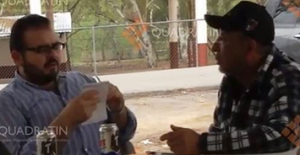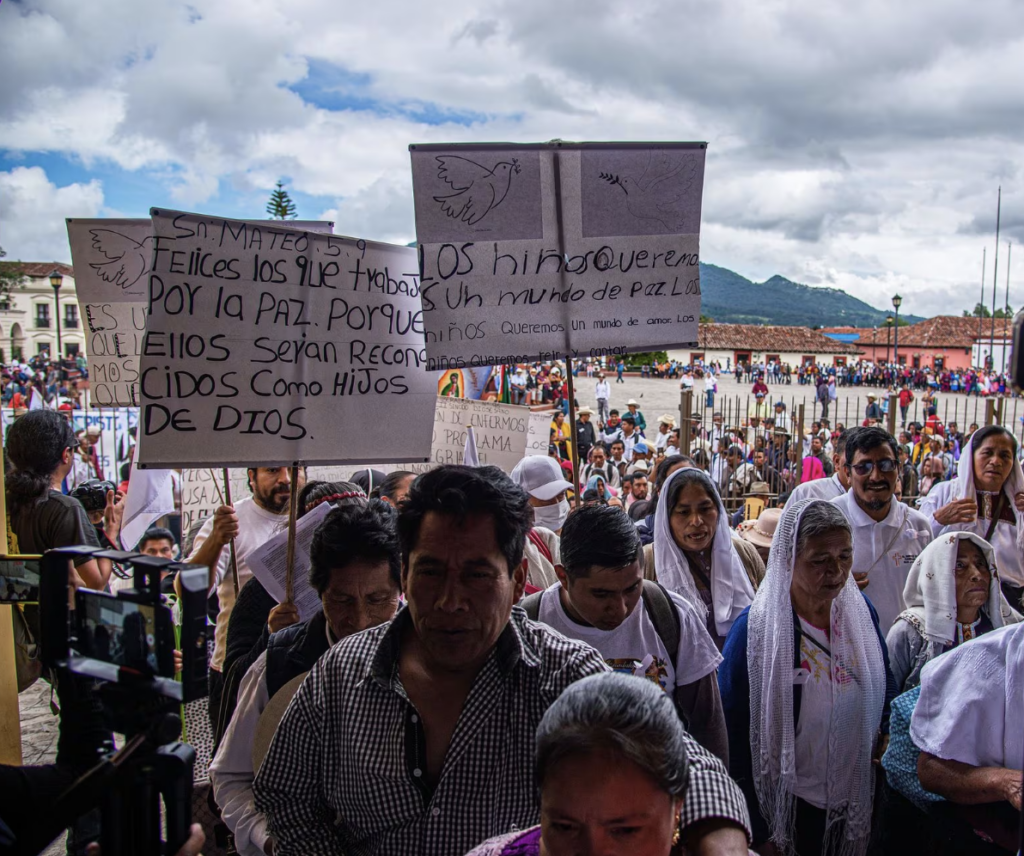
08/27/14 (written by cmolzahn) — Rodrigo Vallejo Mora, son of former Michoacán Governor Fausto Vallejo, has been detained by Mexico’s Attorney General’s Office (Procuraduría General de la República, PGR) while he is being investigated for alleged ties to the Knights Templar (Caballeros Templarios, KTO) criminal organization. Vallejo can be seen in a widely disseminated video meeting with Servando Gómez Martínez, “La Tuta.” He is currently in the Santiaguito Center for Prevention and Social Re-adaptation in the State of Mexico (Estado de México, Edomex), where he is awaiting charges stemming from covering up his meeting with Gómez, since he did not make the Federal Office of the Public Prosecutor (Ministerio Público Federal, MPF) aware of the event.
The PGR said that after spending 48 hours in MPF custody, Vallejo Mora still declined to make any statement regarding the 18-minute video, in which he can be seen drinking a beer and discussing Michoacán politics with Gómez Martínez, one of Mexico’s most wanted criminals. Vallejo voluntarily turned himself over to authorities on August 1, after posting on his Facebook page that he went to the meeting with La Tuta because “the criminals made [him] attend.”
On August 9, a federal judge indicted Vallejo shortly after he was denied an injunction that would have granted him release from prison pending criminal proceedings against him. He will face charges of “encubrimiento,” or covering up information that could have led to La Tuta’s capture. Nevertheless, his case file remains open to further charges against him, should the federal Attorney General’s Office (PGR) decide to do so. His current charges carry a sentence of three months to three years in prison and a fine of 15 to 60 days’ wages.
Also in August, two mayors of municipalities in the Tierra Caliente region of Michoacán are facing allegations of having connections with members of the Knights Templar Organization. Early in the month, Salma Karrum, the mayor of Pátzcuaro, appeared in a video filmed in March of last year alongside “El Tony,” the leader of the Templarios in her municipality. The video was filmed days following the murder of the mayor’s son-in-law, Jonathan Rondan Pacheco (28), in the doorway of Karrum’s home. In the video, she can be heard trying to arrange a meeting with La Tuta to seek an explanation for the murder of her son-in-law. Karrum, of the Institutional Revolutionary Party (Partido Revolucionario Institucional, PRI), confirmed the authenticity of the video and said that she would make herself available to authorities for questioning. Nevertheless, the video has been widely viewed as an indictment of her ability and willingness to hold meetings with members of the Templarios. Authorities have not yet indicated any pending charges against Karrum. Michoacán Attorney General José Martín Godoy Castro said that his agency would analyze and evaluate the relevancy of the video, adding that the Michoacán Attorney General’s Office (Procuraduría General de Justicia del Estado, PGJE) continues to work closely with the PGR, which ultimately has jurisdiction over matters involving organized crime.
More recently, the mayor of the municipality of Huetamo, Michoacán, Dalia Santana Pineda, was arrested on August 14, on charges of homicide and extortion. Her arrest came a day after she appeared at a conference on gender equality, violence, and human rights. Authorities allege that Santana, also of the PRI, ordered the assassination of Antonio Granados Gómez, identified as Santana’s godfather, and with whom she had personal conflicts, according to Michoacán Attorney General Godoy. Godoy stated that his agency determined Santana’s role in Granados’ killing through “testimonies of various people.” Granados was killed on April 9 in a local restaurant by a member of an unnamed criminal group operating in Michoacán, according to state authorities. This allegation further implicates Santana as maintaining ties with organized crime, a charge that would require the involvement of the PGR. The charges of extortion against Santana originate from allegations that she took 20% of Huetamo municipal employees to make payments to La Tuta. There are also allegations that she used the same practice against street vendors in the city.
The arrest of Santana is the latest in a string of mayors detained for alleged ties to organized crime, including those of Lázaro Cárdenas, Parácuaro, Aguililla, Apatzingán, and Tacámbaro. These arrests, along with that of Rodrigo Vallejo and former interim governor and secretary of government Jesús Reyna, has drawn comparisons to the arrests of dozens of Michoacán officials during the presidency of Felipe Calderón (2006-2012), which became known as the “Michoacanazo.” In all, the PGR apprehended 38 state and municipal officials in May of 2009, accused of offering protection to members of the La Familia Michoacana criminal organization, the Templarios’ precursor. The operation has since been qualified as a failure and a blemish on the Calderón presidency, as all 38 were freed in the courts due to a lack of evidence against them, and many returned to their government positions. Of those arrested, 12 were mayors from Tierra Caliente, the region that was the focal point for the self-defense groups (grupos de autodefensa) that formed beginning in February of last year, and now for the government’s public security strategy, spearheaded by the federally-appointed public security commissioner, Alfredo Castillo.
Writing for Milenio, Ricardo Monreal argues that the current hunt for corrupt public officials in Michoacán could have similar results to the 2009 operation, which he says created a state of instability that set the groundwork for the emergence of the self-defense groups, which he characterizes as a significant threat to public security in the state, even if the Templarios are successfully disbanded. As Monreal points out, La Familia Michoacana first emerged as a vigilante group to counter the influence of the Zetas criminal organization in the state. Perhaps most notable about the Michoacanazo was the evident disconnect between federal law enforcement officials and the judiciary regarding the veracity of evidence, which in those cases was often based on statements from protected witnesses, whose reliability has been widely questioned.

Several Mexican news outlets seized on data released by SNSP that show an increase in most crimes during the first half of 2014, since the federal government began implementation of its public security strategy in Michoacán, headed by Commissioner Castillo. Not surprisingly, as it has been particularly critical of President Enrique Peña Nieto’s public security strategy, Proceso, issued a particularly critical report, citing data from the National Public Security System (Sistema Nacional de Seguridad Pública, SNSP) arguing that violent crime rates have increased significantly since Castillo was appointed last January. Proceso references a statement by Castillo during a visit by President Peña Nieto to Michoacán to address hunger that the public security strategy in the state had succeeded in eradicating extortion, including extracting payments from businesses for what is commonly known as “right to grounds” (derecho de piso). Nonetheless, SNSP data show that there were 234 reports of extortion in 2014 from January through June, before an anomalous nine incidents in July. This compares with 104 investigations opened into complaints of extortion in the second half of 2013, according to SNSP data. In its analysis of SNSP data, Proceso found that 2011 had the highest rates of intentional homicides, kidnappings, extortions, and vehicle theft during former President Felipe Calderón’s six-year term (the first half of 2011 outpaced the second half in intentional homicides by about 17%). Compared with the first six months of that year, Proceso found that in January through June of this year there was a 33% increase in intentional homicides, a 40% increase in kidnappings, a 57% increase in violent auto thefts, and triple the number of extortions. The analysis also faults Castillo for arranging for the release from prison of a number of self-proclaimed members of the self-defense groups with known connections to the Caballeros Templarios and the Jalisco New Generation Cartel (Cartel Jalisco Nueva Generación, CJNG).
Days after the report was published in Proceso, Castillo stated that it was “foolish” to compare criminal data between the first six months of 2013 and the corresponding period of 2014. Castillo attributed the rise in reported violent crimes during the first half of the year to an increase in public trust in authorities in the state. Without citing specific data, Castillo, at a meeting of municipal administrators, maintained that violent crime in the state was, in fact, in decline. At the same event, he vowed to go after public employees maintaining ties to organized crime.
Meanwhile, according to a poll conducted by Excélsior and polling firm BGC, perceptions of the security situation both locally and nationwide vary significantly depending on the location of respondents. The poll was conducted at the state level in both Michoacán and Tamaulipas, which are considered to be the two most troubled areas currently in Mexico, and which are the focus of the federal government’s public security strategy; as well as nationally. Whereas the largest contingency of respondents in the Michoacán poll (49%) felt that the public security situation had improved over the past year, respondents in the national and Tamaulipas polls felt that it had worsened (39% and 49%, respectively). A far larger percentage of national respondents (24%) felt that it had stayed the same than in Michoacán and Tamaulipas (16% and 11%, respectively). Public approval for how President Peña Nieto is handling drug trafficking and organized crime differs substantially as well, particularly between the two states polled. While Peña Nieto enjoys a 57% approval rate in Michoacán for his public security strategy, that number falls to 52% nationwide, and to 46% in Tamaulipas. In terms of individual crimes—extortions, cartel-related killings, shootouts, drug trafficking, kidnapping, and “narco-blockades”—a larger portion of respondents in Michoacán said that incidences of each crime had fallen than those who said they had risen during the current administration, while the opposite was the case for Tamaulipas, with the exception of narco-blockades. Meanwhile, nationwide respondents were divided, with shootouts, kidnappings, and narco-blockades receiving positive marks, and problems with extortions, cartel-related killings, shootouts, and drug trafficking worsening.
Sources:
Monreal Ávila, Ricardo. “¿’Michoacanazo’ dos?” Milenio. August 4, 2014.
Muedano, Marcos. “Dan formal prisión a Rodrigo Vallejo.” El Universal. August 9, 2014.




